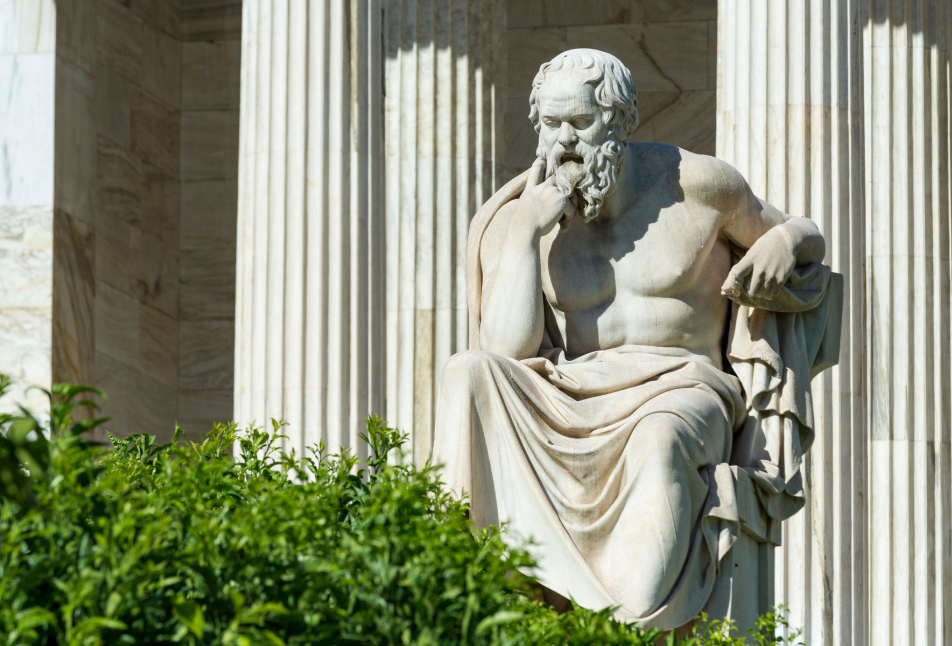Was Socrates the first coach?
The ancient Greek philosophers and coaching
The ancient Greek philosophers, motivated by their love of knowledge (the actual word “philosopher” derives from the Greek words “filos” and “Sophia” which mean “friend” and “wisdom” respectively) have been preoccupied with the investigation of the reasons for human existence and the way men should live, so as to be consistent with their reason for being.
Their views widely appealed to the western world and formed the foundation for western philosophy and psychology, influencing the philosophers who followed, from the oldest to the most contemporary ones, and inspiring passionate support but not without also being questioned.
Today, most of their views seem to have lost nothing of their luster and stand out like shining beacons, especially now that the western world is desperately seeking answers in order to relight its fires!!!
In the text below, I refer to Aristotle and Socrates, the principles and practices they bequeathed us, so as to prove that these have a lot in common with the principles and practices of coaching. In addition, I will attempt to prove that Socrates is the first-ever coach!!!
Aristotle, the student of Plato, teacher of Great Alexander, and the most influential philosopher of the western civilization, philosophy, science, and culture, clearly stated why and how men should live.
According to Aristotle, we should pursue happiness, well-being, or in other words eudemonia.
-A coach urges us to lead a happy life.
According to Aristotle, true happiness is achieved when people develop and leverage all their capabilities.
–The discovery, development, and leveraging of our skills is primarily the aim of an authentic life through coaching.
Our lives’ target is, according to Aristotle, the pursuit of well-being through practicing and developing virtues; Virtues, are our values and models of behavior that guide us towards the way we should lead our lives. Excellence (aristae) is related to the virtuous man, who discovers and explores his/her capabilities (his/her self truth) and practices moderation; the principle of the golden median; the doctrine of the median, that is the avoidance of all excess, exaggeration and shortage.
Some of the Aristotelian virtues were: bravery, temperance, justice, self-control, wisdom.
Excellence (aristae) is also common in the business world. Excellence for Aristotle does not necessarily imply perfection, as is the widely spread notion dominating our modern society. Excellence for Aristotle has to do with more action and not persistence in perfection.
-A coach focuses on obtaining the appropriate personality, which is compatible with the genuine aims leading to a happy life.
According to Aristotle, phronesis (prudence) is a virtue of the man seeking essential knowledge and its implementation, i.e. action.
–Your coach urges you to change your life, to live with integrity, and for this to happen, you have to start practicing it.
Socrates is the first Greek philosopher who investigated human nature and soul.
-The science of coaching puts man and his behavior at its center.
Socrates places the quest for truth, which man has buried deep inside him, at the center of his philosophy,
-Exactly the same way coaching does.
For Socrates, self-awareness is a fundamental principle-value
–Just like in coaching.
Socrates discovers truth through dialogue.
This Socratic dialectic method is called “maieutics – midwifing” because it helps people give birth to the truth – by discovering it for themselves.
Socrates’ mother was a midwife and Socrates used to compare his art of discussion with a midwife’s art. The midwife is not the one giving birth to the child, but the mother.
–Coaching is mainly the investigation of truth through dialogue.
Socrates aimed at discovering people’s limits and questioning the assumptions on which they built their lives.
–Coaching helps the individual to discover their limits and reposition themselves on new a more truthful basis.
Socrates did not teach, He listened. He made his interlocutors discern on their own the flaws and weaknesses of reasoning.
-A coach does the same.
Socrates believed that philosophers had to see beyond the obvious.
–Coaches hold the same view.
Socrates gave us a valuable lesson through his agonizing death. Every individual should accept responsibility for their own actions.
–A coach is aware and defines, that the coachee is solely responsible for his/her actions and their consequences.
Socrates believed that every human should live with integrity that is according to their own true capabilities and desires.
–A coach believes that the best incentive for people to perform difficult acts is for them to discover what truly satisfies them.
Socrates believed in a divine voice, conscience, which dictated what is right and what is fair.
-To a coach, a man’s conscience is his true self.
Ancient, Greek philosophy regarding why and how we live is concentrated on the following.
Why: We live for the quest of “well-being”, of the flourishing life (eudemonia).
How: in a way that we aim at “excellence” (aristae).
Finally, the ancient Greek philosophers in the past and modern coaches now seek the “excellence” (aristae) in us not as a homogenous reality but as a unique areti (virtue) to every individual.
“Flourishing life (eudemonia), Excellence (aristae) – Prudence (phronesis) – Character (ethos) – Virtue (aretae).”


Excellence can be the individual who leads a prudent life (phronesis) (seeking the truth, the essential knowledge via actions), or a life of virtue (aretae) (median – self-control) and goodwill (eunoia) with good – virtuous intentions and mood. In other words, the person who lives with “ethos”; who is of a moral character.
Harmony and balance are the aims of coaching; harmony is related to integrity and balance to the achievement of the satisfaction deriving from self-realization. In other words, coaching is related to seeking the “excellence” in us, to discovering and leveraging our best selves.




